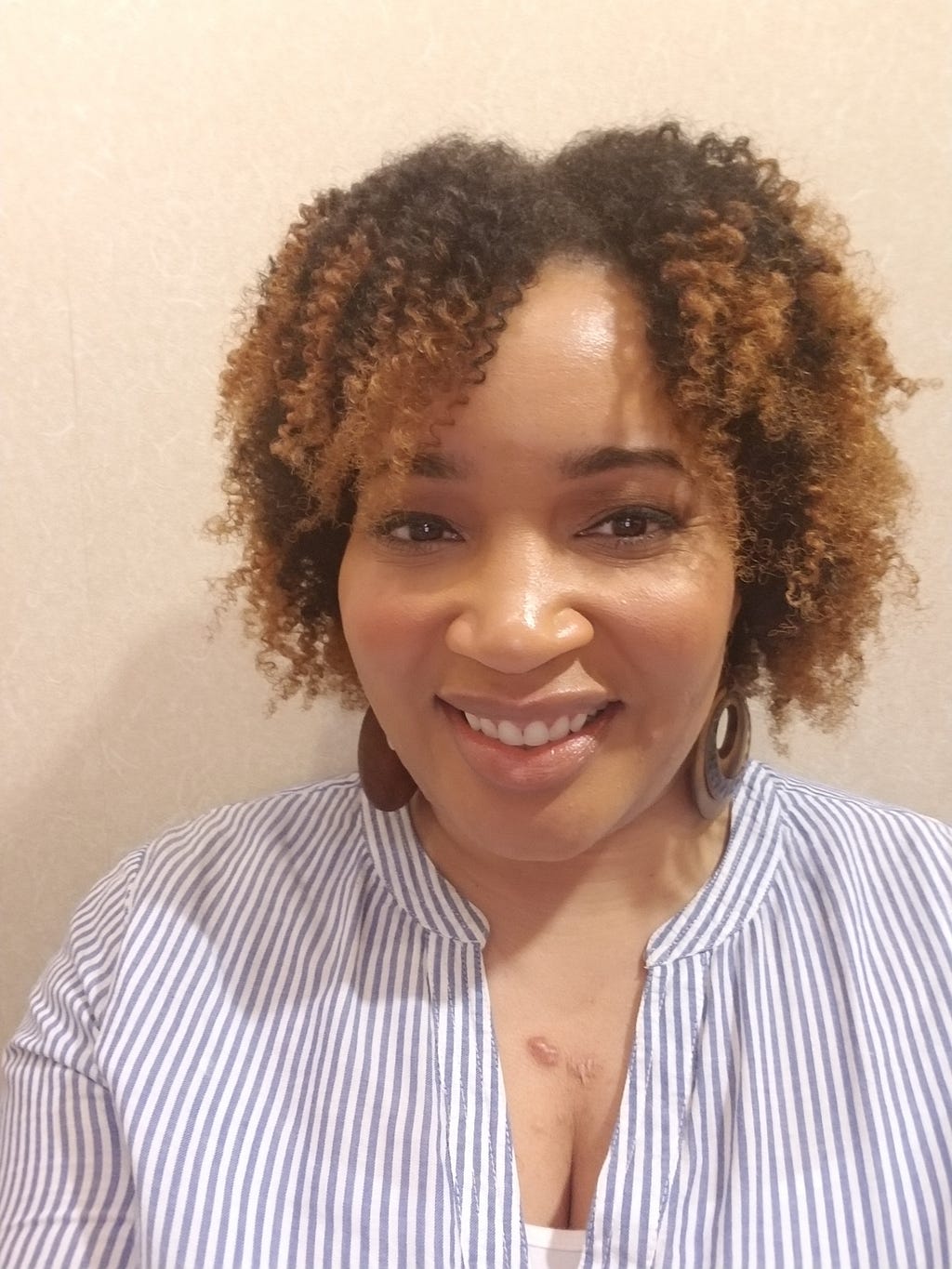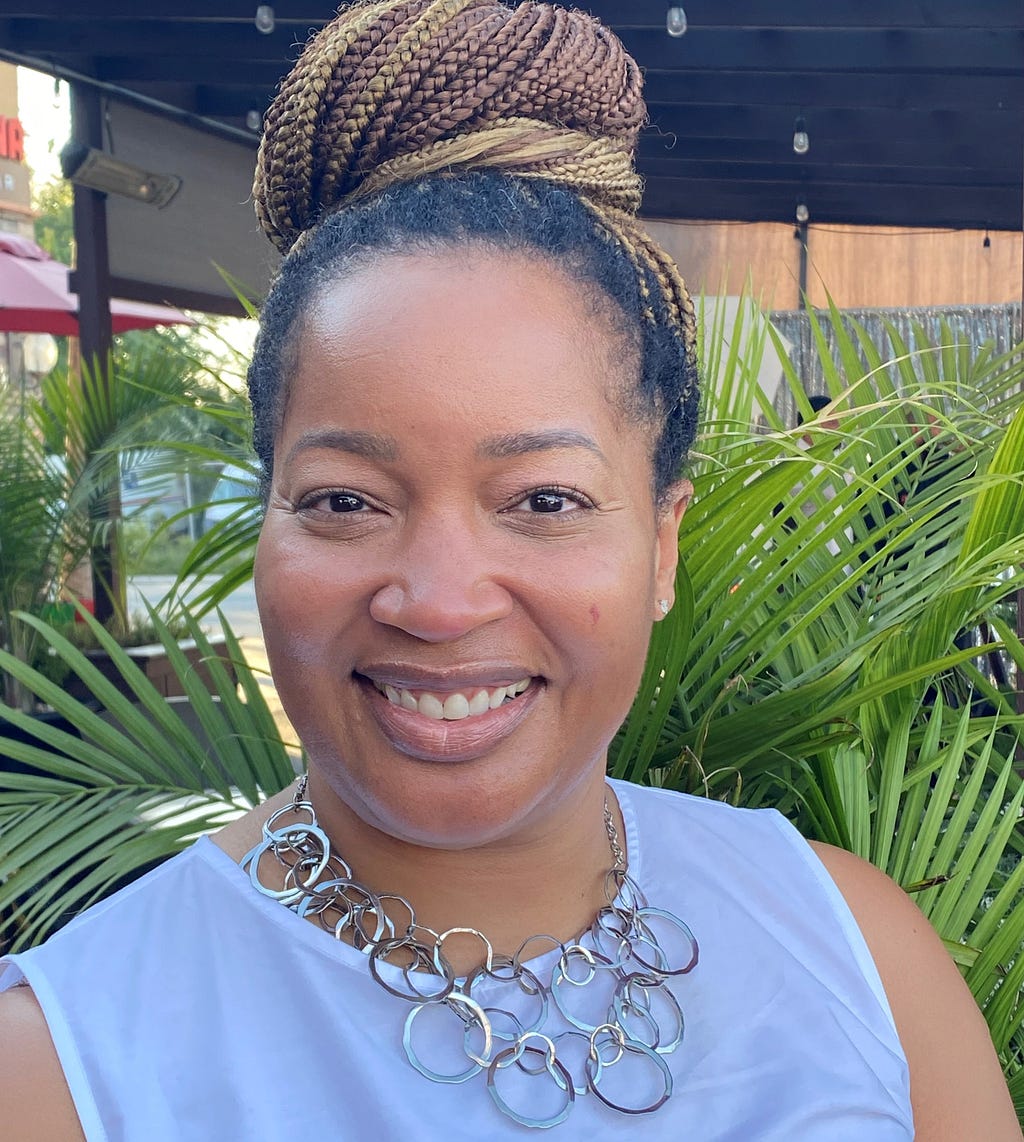
I believe in the power of sleep. As a part of my daily wind down process I incorporate meditation to help my mind relax as my body is relaxing. I ensure I get about 5–6 hours of sleep a night which is enough for my body to wake up feeling refreshed. Listening to your body will help you determine how much sleep you need to wake up feeling refreshed.
As a part of our series about Mental Health Champions helping to promote mental wellness, I had the pleasure to interview Jennell Jackson, LCSW.
Jennell Jackson, LCSW has been a therapist for the past 15 years and has owned her group practice, Jackson Counseling Services, since 2014 where she specializes in providing treatment for client’s who are experiencing trauma, anxiety, and depression.
Thank you so much for doing this with us! Before we dig in, our readers would like to get to know you a bit. Can you tell us a bit about how you grew up?
I was raised by a single mother who worked very hard to ensure I wanted for nothing. My mother was financially strapped, but she never let me feel it. She had an amazing work ethic that was passed on to me. I spent a few summers with my grandparents beginning at the age of 14 which was when I also had my first job working at the Salvation Army. I was a social butterfly in high school, and college but I didn’t fall in love with learning until I began college.
You are currently leading a social impact organization that is helping to promote mental wellness. Can you tell us a bit about what you or your organization are trying to address?
I want to make mental health more accessible. I also want to destigmatize the idea of attending therapy and taking medication for mental health needs. I believe everyone should have a safe space where they feel free to be themselves.
Can you tell us the backstory about what inspired you to originally feel passionate about this cause?
Growing up I didn’t hear much about mental health. The little I did hear always had a negative undertone attached to it because, growing up, I was taught not to share personal issues with outsiders. I remember growing up in church where it was taught that all you needed to do was pray and trust God to take away all your ailments.
Many of us have ideas, dreams, and passions, but never manifest them. They don’t get up and just do it. But you did. Was there an “Aha Moment” that made you decide that you were actually going to step up and do it? What was that final trigger?
I worked at a job for nine years that had an hour and a half commute each way. If I was running late the commute could easily turn into three hours one way. Once I had my daughter, I wanted a better quality of life where I spent more time with my family and less time on the road. Giving my family a different life than I had growing up. A change I knew I could provide with dedication and focus.
Can you share the most interesting story that happened to you since you began leading your company or organization?
When I was just starting out in private practice, I was given the opportunity to be one of two main speakers at a Valentine’s Day event in Manhattan, NY. I was very excited about the opportunity, but I was also experiencing imposter syndrome. I felt like I was not seasoned enough to give anyone advice even though this is my job daily but individually rather than as a group.
I practiced daily for two weeks and the day of the event the program on my laptop that held my slides wouldn’t open. I was frozen.
Can you imagine a therapist at the beginning of presentation with high anxiety and only a few notes? The decision I made in that moment would determine how the reset of the presentation would go. I decided to make a joke out of my anxiety over public speaking and my technical malfunction. Over half the group laughed and raised their hands when I asked if they could relate. This was a such a great ice breaker and I flowed into the rest of my presentation freely. That day ended up becoming the best worse day of my life.
None of us can be successful without some help along the way. Did you have mentors or cheerleaders who helped you to succeed? Can you tell us a story about their influence?
I had so many people in my life who have helped me reach this point in my life. My mother was a huge support when I began my business back in 2014. My mother watched my daughter, which allowed the time to work fulltime and part time. My full-time job paid for the startup costs of the part time job which was my business. At that time, I was seeing clients 3 evenings a week. My mother played a huge role in raising my daughter which allowed me to focus on my business. I couldn’t have done it without her.
According to Mental Health America’s report, over 44 million Americans have a mental health condition. Yet there’s still a stigma about mental illness. Can you share a few reasons you think this is so?
I feel the stigmas that are associated with mental health have carried over from previous generations. The triggers can be family based, culturally based, or religiously based.
For many people, mental health is associated with being considered “crazy”, being in a straight jacket, or being in a padded room.
There is also belief that mental health is not real, and people should be able to just “get over” the things they are going through. The triggers for the symptoms of mental health can be a heavy conversation for the speaker as well as the listener. Therefore, the tendency is for the listener to minimize what is being said.
In your experience, what should individuals, society, and the government do to better support people suffering from mental illness?
I think overall there has been a large improvement in how mental health is viewed.
Individuals can better support others suffering from mental illness by having an open mind and a willingness to learn. If we, as individuals, can have those two things it allows emotional space within us for empathy for others. Many times, people are judged by others when there is a lack of understanding or knowledge about a particular subject. The more empathy we have for each other the more tolerance we will have for each other.
Society is doing a much better job now than they have been in the past destigmatizing mental health. This is evident in the way mental health resources are advertised on social media, television, and the internet. The number of celebrities who have spoken out about their mental health journey has helped to make it okay to voice not being okay. I wish there were more cultural mental health resources available for disenfranchised communities. Many of the cultural stigmas have been passed down through the generations where it makes those who are dealing with mental illness afraid to speak up because of what their family may think of them.
I want the government to provide better support by providing a higher rate of reimbursement to mental health providers who accept Medicaid and Medicare. There are limited number of therapists who can accept the two insurances especially Medicaid due to the low reimbursement rate. If mental health providers rallied together for higher reimbursement rates like medical providers receive there would be more options for the clients covered by these insurances to receive individual care. A higher reimbursement rate would let mental health providers know the job they perform and the population they serve is valued.

What are your 5 strategies you use to promote your own wellbeing and mental wellness? Can you please give a story or example for each?
- I enjoy self-care. Self-care can take place in a range of activities that allow me to clear my mind. Working out which includes cardio, barre, and yoga are a huge stress reliever that allows me time to clear my mind. At least four days a week I begin my day with working out. I always listen to my body and some days that means doing nothing but reading a book or watching television.
- I maintain a work/life balance. As an entrepreneur I had to learn how to stop working. There will always be something that needs to be taken care of. I had to set boundaries in this area to ensure I was spending time with my daughter. At the end of the day, she is the reason why I work as hard as I do. I want to leave her with a legacy that allows her to be in a great financial position and that is also full of memories of us together. I also ensure I spend time with my family who have remained a constant support in my life.
- I spend time with friends. Everyone in my life can fit into three tables: inner table, outer table, and acquaintance table. The inner table should be a small table filled with people who you have a reciprocal relationship where you can be unfiltered, always depend on, and they have unfiltered access to you under the surface. The people at the outer table you spend time with for a specific reason like a theater friend, antiquing friend, or a bowling friend. The friends at this table would have access to a small amount of under the surface information as it relates to a particular activity. The acquaintance table are friends you deal with at an arm’s length surface level capacity. It is therapeutic for me to spend time with my inner table friends who are encouraging, supportive, empathetic, amazing listeners, and provides laughter.
- I use the word no. I think it is just as important to use the word no as it is to use the word yes. When you overextend yourself for others on a consistent basis by saying yes when you really want to say no it allows your sense of peace to be disrupted. Your peace should be protected at all costs which means setting boundaries with the people in your life. If you begin to feel guilty putting these steps in action remind yourself those in your life who want the best for you will never be upset because you chose to out yourself first.
- I believe in the power of sleep. As a part of my daily wind down process I incorporate meditation to help my mind relax as my body is relaxing. I ensure I get about 5–6 hours of sleep a night which is enough for my body to wake up feeling refreshed. Listening to your body will help you determine how much sleep you need to wake up feeling refreshed.
What are your favorite books, podcasts, or resources that inspire you to be a mental health champion?
A few of my favorite books are Healing after Loss by Martha Whitmore Hickman, Abundance Now by Lisa Nichols, and The Body Keeps the Score by Bessel A. Van Der Kolk. These are all great reads to pick up for anyone, not just a licensed therapist.
If you could tell other people one thing about why they should consider making a positive impact on our environment or society, like you, what would you tell them?
The best thing we can always offer each other and ourselves is space and grace. Everyone should be afforded the space to make mistakes or experience setbacks. Everyone also deserves the grace to not be judged or defined by those mistakes.
How can our readers follow you online?
Facebook: Jackson Counseling Services
Instgram: j_counseling
Twitter: j_counseling
www.jacksoncounselingservices.com
Thank you so much for sharing these important insights. We wish you continued success and good health!
Mental Health Champions: Why & How Jennell Jackson Is Helping To Champion Mental Wellness was originally published in Authority Magazine on Medium, where people are continuing the conversation by highlighting and responding to this story.
